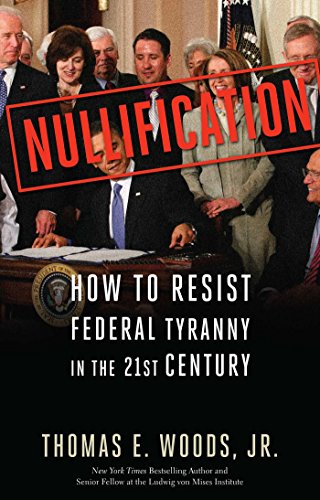If Thomas E. Woods had dropped dead at the beginning of 2010, his place among his generation of libertarian scholars would have already been secure. As a C-Span favorite, senior fellow at the Ludwig von Mises Institute, and author of "The Politically Incorrect Guide to American History" and last year’s best-selling Meltdown, the Harvard- and Columbia-trained historian has risen to the top of his field.
His newest title, Nullification: How to resist federal tyranny in the 21st century, to be released next week, is a worthy addition to his body of work – well researched, clearly organized and comprehensively presented. It is as readable and entertaining as it is informative.
Nullification, Woods explains, is the process whereby state legislatures protect their people from unconstitutional legislation out of Washington. As we’ve discussed in this space several times this year, some states are resolving to shield their people from certain mandatory health insurance laws. Others are attempting to block unconstitutional firearms restrictions. Still others are blocking federal bans on marijuana.
Woods gives fair hearing to the "broad constructionist" point of view, so popular among Democrats and Republicans, that the "general welfare," "interstate commerce" and "necessary and proper" clauses of the Constitution carry such weight as to negate the rest of the document. The federal government is empowered to do whatever it wants without limit. The only recourse, if the people dislike federal actions, is to the Supreme Court.
 Nullification: How to ...
Best Price: $2.00
Buy New $8.34
(as of 05:25 UTC - Details)
Nullification: How to ...
Best Price: $2.00
Buy New $8.34
(as of 05:25 UTC - Details)
Woods puts that baby to bed thoroughly. You want to put the fate of liberty, justice and the Constitution in the hands of a small clique of wealthy, politically well-connected lawyers? And federal employees at that? Deferring to some of the best minds of the Constitution era, Woods quotes Virginia’s Judge Spencer Roane: "The States never could have committed such egregious folly as to agree that their umpire would be altogether appointed and paid by the other party,"
Even Hamilton, never a friend of liberty or limited government, wrote in Federalist 78 that "every act of a delegated authority contrary to the tenor of the commission under which it is exercised is void." Unconstitutional acts cannot be passed by the federal government, Hamilton said, because such acts would by definition not be law. Such acts are null and void.
Woods points to the failure of the Supreme Court to intervene during the Alien and Sedition Act era, when the Federalist-controlled government attempted to silence criticism through fines and imprisonment. America’s champions in that dark hour were Thomas Jefferson and James Madison, who authored the Virginia and Kentucky resolutions nullifying the hated act.
 Meltdown: A Free-Marke...
Best Price: $0.25
Buy New $20.00
(as of 02:20 UTC - Details)
Meltdown: A Free-Marke...
Best Price: $0.25
Buy New $20.00
(as of 02:20 UTC - Details)
Sadly, that spirit of limited government and states that protect their citizens from federal aggression has faded entirely. To demonstrate the slavish obedience taught to American students today, Woods quotes Britney Spears, saying "We should trust our president in every decision he makes and should support, you know, and be faithful."
"Thomas Jefferson took the opposite view," Woods asserts, the humor in contrasting the political ideas of Spearsianism and Jeffersonianism being typical of his highly readable style.
Indeed, it’s his manner and choice of words that elevate Woods over his peers. The precision and authority of a history scholar never lets up, yet his delivery is casual, conversational and often terribly funny. He has mastered the tone of the egalitarian demagogue without sacrificing the sober and reasonable approach of the serious scholar. His passion for America comes through on every page.
Yet, he laments, America has lost not only the idea of states as defenders and guarantors of liberty, but the very idea of limited government. "We have been taught to believe the best way to organize society is for an infallible and irresistible central authority to issue commands to lesser, subordinate bodies. … These subordinate bodies exist at the pleasure of the central authority (with) no independent existence of their own."
This re-writing of history has been so complete and pervasive that today a teacher can, without laughter or ridicule or loss of professional credibility, maintain that the federal government "created" the states. The fact that the states, and only the states, ratified the federal Constitution notwithstanding.
As well written as his book is, Woods manages to bring even the most oblivious reader up to speed in a few pages. Indeed, the bulk of the book is a guided tour through the writings and speeches of the great leaders of America’s founding and early, pre-Lincoln era, including James Madison, Jonathan Trumbull, and that lion of liberty and states’ rights, John Calhoun. These appendixes take up fully half the book but make excellent reading in that they are well-selected and so rarely cited as to be unfamiliar to even the more interested amateur historian.
This book belongs on your shelf right next to Charles Adams, Tom DiLorenzo, John Graham and James and Walter Kennedy. There it will gather dust, utterly ignored by lawyers, journalists and politicians who have no answer for its arguments. In an era when patriotism and libertarianism are so archaic as to be practically unheard of, a book like this one will serve to remind defenders of liberty that they are not alone. Truth, as the great Jerry Clower once said, is clear as a bell, but is not often "tolled."
Reprinted with permission from The McDowell News.
July 5, 2010
Reporter and columnist Britt Combs writes for The McDowell News.





